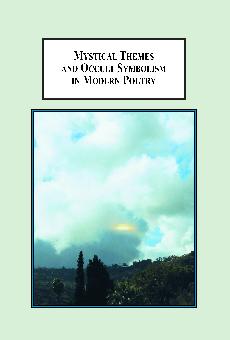This is our backup site. Click here to visit our main site at MellenPress.com
Mystical Themes and Occult Symbolism in Modern Poetry: Wordsworth, Whitman, Hopkins, Yeats, Pound, Eliot, and Plath

| Author: | Kim, Dal-Yong | |
| Year: | 2009 | |
| Pages: | 288 | |
| ISBN: | 0-7734-3780-0 978-0-7734-3780-7 | |
| Price: | $199.95 | |
This study argues that esoteric ideas of Friedrich Nietzsche and James Frazer provide answers to ontological questions about the origin and substance of poets looking beyond the established rationalist codes of the industrial society.
The ideas also give comprehensive critical insight into creative bases on which the poets’ various mystical or occult ideas work to produce their distinct creative characters.
The ideas also give comprehensive critical insight into creative bases on which the poets’ various mystical or occult ideas work to produce their distinct creative characters.
Reviews
“In relating mysticism, sacramentalism, Dionysianism and even Puritanism to occultism [the author] shows the complex nature of this literary phenomena. He shows how occultism went hand in hand with modern psychology's exploration of the unconscious and the search for a renewed understanding of the self.” – Prof. Timothy Materer, University of Missouri-Columbia
“The author surveys a healthy sampling of the poetry from several poets whose production was in some instances prodigious, but he also cites notebook entries, letters, and other extratextual evidence to secure his point. This book certainly contributes to existing scholarship and often makes revealing and persuasive points about both the poets and the poetry throughout.” – Prof. Thomas Quirk, University of Missouri-Columbia
“Professor Kim offers Friedrich Nietzsche s Dionysian creativity as one of the major sources that these modern poets drew on for their interest in the occult and mystic. By bringing under a spotlight the hitherto underappreciated role of Nietzsche in the development of literary occultism and mysticism in the modernist era, Professor Kim, in effect, contributes a fascinating insight to the ongoing discussion on the relationship between Romanticism and modernism. Modernism can now be convincingly said to have taken over the Romantic responses against the Enlightenment rationality and schematism in its characteristic antipathy toward the absurdity and futility of the modern existence.” – Prof. Jongsook Lee, Seoul National University
“The author surveys a healthy sampling of the poetry from several poets whose production was in some instances prodigious, but he also cites notebook entries, letters, and other extratextual evidence to secure his point. This book certainly contributes to existing scholarship and often makes revealing and persuasive points about both the poets and the poetry throughout.” – Prof. Thomas Quirk, University of Missouri-Columbia
“Professor Kim offers Friedrich Nietzsche s Dionysian creativity as one of the major sources that these modern poets drew on for their interest in the occult and mystic. By bringing under a spotlight the hitherto underappreciated role of Nietzsche in the development of literary occultism and mysticism in the modernist era, Professor Kim, in effect, contributes a fascinating insight to the ongoing discussion on the relationship between Romanticism and modernism. Modernism can now be convincingly said to have taken over the Romantic responses against the Enlightenment rationality and schematism in its characteristic antipathy toward the absurdity and futility of the modern existence.” – Prof. Jongsook Lee, Seoul National University
Table of Contents
Foreword Professor Timothy Materer
Preface
Acknowledgements
Abbreviations
1. Literary Mysticism and Occultism: Critical Introduction
2. William Wordsworth’s “Spots of Time”and the Enlightenment
3. Walt Whitman’s “Democratic Self’ and the “Mystic Orient”
4. Gerard Manley Hopkins’s “Inscape” as Natural Sacramentalism
5. W. B. Yeats’s Occult Poetics: The “Wisdom of the Daemonic Image”
6. Ezra Pound’s “Modern Eleusis” and Friedrich Nietzsche’s Dionysianism
7. T. S. Eliot’s “Still Point” and New England Puritanism
8. Sylvia Plath’s Vitalist Occultism: “A Piranha Religion”
9. The Mystic, the Occult, and the Self
Works Consulted
Index
Preface
Acknowledgements
Abbreviations
1. Literary Mysticism and Occultism: Critical Introduction
2. William Wordsworth’s “Spots of Time”and the Enlightenment
3. Walt Whitman’s “Democratic Self’ and the “Mystic Orient”
4. Gerard Manley Hopkins’s “Inscape” as Natural Sacramentalism
5. W. B. Yeats’s Occult Poetics: The “Wisdom of the Daemonic Image”
6. Ezra Pound’s “Modern Eleusis” and Friedrich Nietzsche’s Dionysianism
7. T. S. Eliot’s “Still Point” and New England Puritanism
8. Sylvia Plath’s Vitalist Occultism: “A Piranha Religion”
9. The Mystic, the Occult, and the Self
Works Consulted
Index
